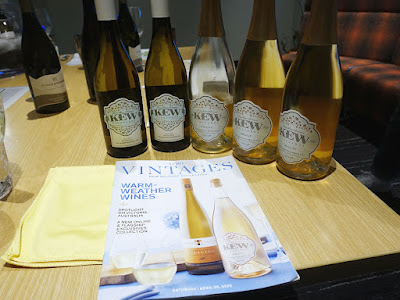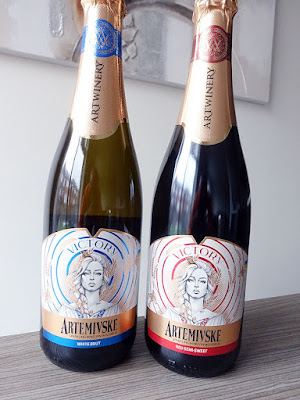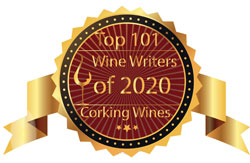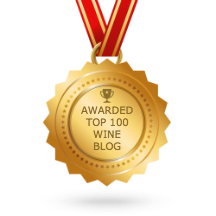Tonight's wine reviews are a trio of exceptional wines that were launched this past summer by Inniskillin Wines to celebrate their 50th anniversary. As they celebrated their first 50 years of excellence with great pride, they are also looking forward to the next 50 years, which promises to be even more exciting. This excitement is fuelled by Canadian innovation and the launch of a series of new, premium wines to elevate your table.
The first 50 years at Inniskillin began when it was granted the first winery licence since prohibition in 1975 to become Canada's first estate winery. It was established by Donald Ziraldo and Karl Kaiser, two friends and business partners who became instant pioneers in Canadian winemaking after taking big risks and earning many firsts in the Canadian wine history. Karl was the Head Winemaker and helped develop Inniskillin's reputation for over 30 years before eventually stepping away from the project in 2006.
In 2007, Bruce Nicholson assumed the role of senior winemaker at Inniskillin in Niagara. Bruce had previously spent approximately 20 years working in the Okanagan Valley before returning to Niagara to provide leadership and ensuring that Inniskillin continued to excel.
In 2013, Nicholas Gizuk joined Inniskillin and rose up through the ranks within the company to become Head Winemaker at Inniskillin's Niagara Estate in 2001. Nicholas is part of a new generation of winemakers that stand on the shoulders of Donald and Karl. This new generation of winemakers are using the success of the last 50 years as the foundation for what’s next and believe that the next chapter will be even more exciting.
Nicholas Gizuk says that "With a renewed focus on single vineyard expressions, we're showcasing the incredible diversity of Canadian terroir through wines that are unmistakably Inniskillin, Our intimate history and experience with this land and these grapes puts us in a position to develop one-of-a-kind wines that simply can't be re-created anywhere else."
Today, as Canada's oldest winery, Inniskillin Wines is synonymous with Canadiana and part of a family of wineries owned by Arterra Wines Canada. Inniskillin is looking to the future and is ready to redefine what premium Canadian wine can be once again with innovative techniques and over 50 years of experience that focus on every aspect of from terroir to winemaking, to deliver high-quality wines that can only be made in Canada.
In addition to this Single Vineyard Riesling and a pair of Single Vineyard Cabernet Franc wines, the other two wines in the series are the 2022 Inniskillin Illuvia Cabernet Franc, which I enjoyed a couple of months ago, and the 2024 Inniskillin Zabek Single Vineyard Riesling Icewine. All five wines in the series are available at Inniskillin and online at Great Estates Niagara, while the Icewine is also available in very limited quantities at the LCBO. Inniskillin's 50th Anniversary Series wines are ideal companions to elevate your next hosting engagement or gifting needs.
Stelvin screw cap enclosure. The medium-high intensity nose has lovely, focused aromas of orange zest, white peach, honeyed melon, and lemon/lime citrus, plus whiffs of petrol and limestone minerality adding savoury complexity. It's medium+ bodied with impressive concentration and structure on the dry palate with delicious beeswax, honey, white peach, orange, and melon replays, plus white grapefruit, spice and leesy mineral flavours. It has crisp, succulent, and structured acidity, along with a finely textured mouthfeel. Nicely balanced throughout, and tapering to leesy minerals and limestone on the savoury finish, with excellent length. Score: 92 pts
Pairs with: Light, textured fish, poached and fried white meats, shellfish, sushi, mild Asian cuisine, and citrus-based sauces.
INNISKILLIN SINGLE VINEYARD HERON POND CABERNET FRANC 2023 - VQA Beamsville Bench, Niagara Escarpment, Ontario, Canada (XD) - $37.18
The medium-high intensity nose is clean and fresh, with herbaceous aromas mingling with ripe red & black fruits, currant, black cherry, and tobacco, plus touches of cedary oak spice and reductive notes. It's medium+ to medium-full bodied on the dry, elegant, and complex palate with ripe red fruits, red currant, black cherry, red licorice, and red plum nuanced with dried herbs, gentle oak spice, tobacco flavours. It is well-balanced throughout with refreshing acidity, and smooth, elegant, and fine-grained tannins. Tobacco, spice, and savoury earth notes linger on long, well-structured, and balanced finish. Score: 91+ pts
Pairs with: Rare red meats, roasted red meats, game meats, cured and salted meats, tomato-based sauces, vegetable dishes, full-flavoured sauces, tart red fruit sauces and firm cheeses.
INNISKILLIN SINGLE VINEYARD LAMENT FARMS CABERNET FRANC 2023 - VQA St. David's Bench, Niagara-on-the-Lake, Ontario, Canada (XD) - $37.18
The medium-high intensity nose has savoury dark fruited aromas rising out of the glass, with layers of black currant, dark cherry, cedar, savoury oak spice, and earthy mineral, plus flecks of white pepper and Damson plum adding further interest and complexity. The medium-full bodied palate is dry and well-structured with more dark fruited replays of currant, cassis, black cherry, oak spice, pipe tobacco, savoury earth, and dried herb flavours. Acids are crisp and juicy, while the firm, somewhat youthful tannins are well-structured. Touch grippy and slightly tangy with dark berry, savoury earth, and dried herbal notes on the long-lasting finish. Enjoyable now, but should improve with time in the cellar and drink well over the next 6-8 years. Score: 92 pts
Pairs with: Rare red meats, roasted red meats, game meats, cured and salted meats, tomato-based sauces, vegetable dishes, full-flavoured sauces, bitter chocolate, tart red fruit sauces, and firm cheeses.
The first 50 years at Inniskillin began when it was granted the first winery licence since prohibition in 1975 to become Canada's first estate winery. It was established by Donald Ziraldo and Karl Kaiser, two friends and business partners who became instant pioneers in Canadian winemaking after taking big risks and earning many firsts in the Canadian wine history. Karl was the Head Winemaker and helped develop Inniskillin's reputation for over 30 years before eventually stepping away from the project in 2006.
In 2007, Bruce Nicholson assumed the role of senior winemaker at Inniskillin in Niagara. Bruce had previously spent approximately 20 years working in the Okanagan Valley before returning to Niagara to provide leadership and ensuring that Inniskillin continued to excel.
In 2013, Nicholas Gizuk joined Inniskillin and rose up through the ranks within the company to become Head Winemaker at Inniskillin's Niagara Estate in 2001. Nicholas is part of a new generation of winemakers that stand on the shoulders of Donald and Karl. This new generation of winemakers are using the success of the last 50 years as the foundation for what’s next and believe that the next chapter will be even more exciting.
Nicholas Gizuk says that "With a renewed focus on single vineyard expressions, we're showcasing the incredible diversity of Canadian terroir through wines that are unmistakably Inniskillin, Our intimate history and experience with this land and these grapes puts us in a position to develop one-of-a-kind wines that simply can't be re-created anywhere else."
Today, as Canada's oldest winery, Inniskillin Wines is synonymous with Canadiana and part of a family of wineries owned by Arterra Wines Canada. Inniskillin is looking to the future and is ready to redefine what premium Canadian wine can be once again with innovative techniques and over 50 years of experience that focus on every aspect of from terroir to winemaking, to deliver high-quality wines that can only be made in Canada.
In addition to this Single Vineyard Riesling and a pair of Single Vineyard Cabernet Franc wines, the other two wines in the series are the 2022 Inniskillin Illuvia Cabernet Franc, which I enjoyed a couple of months ago, and the 2024 Inniskillin Zabek Single Vineyard Riesling Icewine. All five wines in the series are available at Inniskillin and online at Great Estates Niagara, while the Icewine is also available in very limited quantities at the LCBO. Inniskillin's 50th Anniversary Series wines are ideal companions to elevate your next hosting engagement or gifting needs.
Tasting Notes:
INNISKILLIN SINGLE VINEYARD MONTAGUE RIESLING 2024 - VQA Four Mile Creek, Niagara-on-the-Lake, Ontario, Canada (XD) - $29.22Stelvin screw cap enclosure. The medium-high intensity nose has lovely, focused aromas of orange zest, white peach, honeyed melon, and lemon/lime citrus, plus whiffs of petrol and limestone minerality adding savoury complexity. It's medium+ bodied with impressive concentration and structure on the dry palate with delicious beeswax, honey, white peach, orange, and melon replays, plus white grapefruit, spice and leesy mineral flavours. It has crisp, succulent, and structured acidity, along with a finely textured mouthfeel. Nicely balanced throughout, and tapering to leesy minerals and limestone on the savoury finish, with excellent length. Score: 92 pts
Pairs with: Light, textured fish, poached and fried white meats, shellfish, sushi, mild Asian cuisine, and citrus-based sauces.
INNISKILLIN SINGLE VINEYARD HERON POND CABERNET FRANC 2023 - VQA Beamsville Bench, Niagara Escarpment, Ontario, Canada (XD) - $37.18
The medium-high intensity nose is clean and fresh, with herbaceous aromas mingling with ripe red & black fruits, currant, black cherry, and tobacco, plus touches of cedary oak spice and reductive notes. It's medium+ to medium-full bodied on the dry, elegant, and complex palate with ripe red fruits, red currant, black cherry, red licorice, and red plum nuanced with dried herbs, gentle oak spice, tobacco flavours. It is well-balanced throughout with refreshing acidity, and smooth, elegant, and fine-grained tannins. Tobacco, spice, and savoury earth notes linger on long, well-structured, and balanced finish. Score: 91+ pts
Pairs with: Rare red meats, roasted red meats, game meats, cured and salted meats, tomato-based sauces, vegetable dishes, full-flavoured sauces, tart red fruit sauces and firm cheeses.
INNISKILLIN SINGLE VINEYARD LAMENT FARMS CABERNET FRANC 2023 - VQA St. David's Bench, Niagara-on-the-Lake, Ontario, Canada (XD) - $37.18
The medium-high intensity nose has savoury dark fruited aromas rising out of the glass, with layers of black currant, dark cherry, cedar, savoury oak spice, and earthy mineral, plus flecks of white pepper and Damson plum adding further interest and complexity. The medium-full bodied palate is dry and well-structured with more dark fruited replays of currant, cassis, black cherry, oak spice, pipe tobacco, savoury earth, and dried herb flavours. Acids are crisp and juicy, while the firm, somewhat youthful tannins are well-structured. Touch grippy and slightly tangy with dark berry, savoury earth, and dried herbal notes on the long-lasting finish. Enjoyable now, but should improve with time in the cellar and drink well over the next 6-8 years. Score: 92 pts
Pairs with: Rare red meats, roasted red meats, game meats, cured and salted meats, tomato-based sauces, vegetable dishes, full-flavoured sauces, bitter chocolate, tart red fruit sauces, and firm cheeses.



































